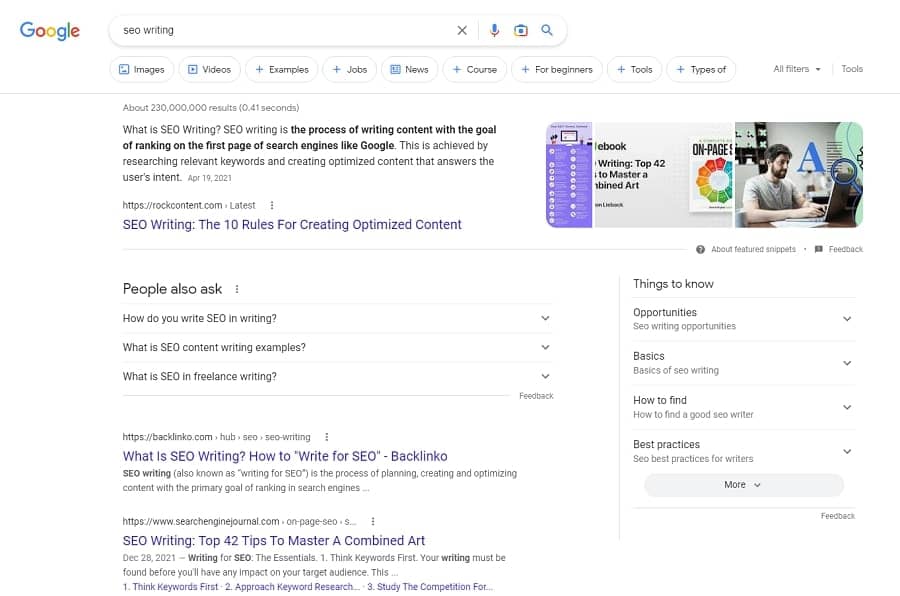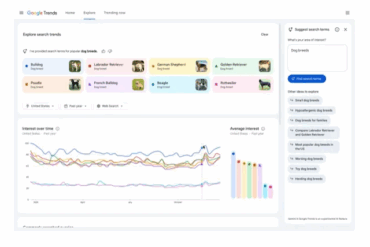By Liliana Benzel
Top-quality SEO writing is the lifeblood of the internet and the heartbeat of all successful websites.
Whether you’re a blogger, an e-shop owner, or you operate a brick-and-mortar business with an online component, quality SEO content is the key to search engine success.
But what’s SEO writing? Why is it essential for online performance? And how do you write well enough for SEO that Google will rank your content well?
For anyone new to the world of online content writing, these questions can be a significant obstacle, obscuring the path to clicks, conversions, and revenue for your website.
Thankfully, we’re here to help you break the barriers and learn the intricate art of SEO content creation.
Below, we’ll cover over a dozen top-tier SEO writing tips that every beginning SEO content writer should use for their online content.
Let’s jump in!
What is SEO Writing?
Before you can understand what SEO writing is, you need to understand SEO itself.
SEO, or Search Engine Optimization, is the specialized process of ensuring your website’s content meets the standards of a search engine’s algorithm.
For example, Google’s algorithm likes quality content that:
- Is easy to understand
- Displays a level of expertise, authoritativeness, and trustworthiness
- Effectively addresses people’s search queries
So, SEO writing, or “writing for SEO,” is the creation and optimization of written content to please search engines enough that they’ll rank your work well in results pages.
But why does SEO matter so much for search engines?
Why is it Critical for Quality Content Creation?
Online success depends on how many readers you can attract to your content.
However, the number of people you can attract depends on which page of the search results you rank on and how high your ranking is on the page.
For example, did you know nearly 30% of all clicks go to the #1 ranking site on the first page of Google’s search results? That’s almost a third of all traffic for a search query!
Because high Google rankings are so critical to online success, millions of blogs and websites compete for the top spots on Google’s first page.
As an online creator, producing top-quality SEO writing is the only way you’ll have a chance at ranking.
Whether you’re a casual fan of SEO copywriting or a freelancer providing clients with an SEO content writing service, it’s essential to understand the basics of SEO writing if you want to conquer online.
SEO Writing Basics: Key Terms to Note

Before we delve into the tips that beginners should know, there are several important terms to note…
Keywords
Specific phrases and words people look for in search engines and what you build your SEO content around.
Long-tail Keywords
A phrase or string of keywords that are more specific than normal keywords.
Organic Keyword Difficulty
A (1–100) score of how hard it is to rank for a keyword.
Search Queries
Words or phrases people look up in search engines.
Search Volume
The total number of times people search for a specific term in a month.
Search Engine Results Pages (SERPs)

The pages containing search results within search engines, like Google.
SERP Position
The ranking of a page within the SERPs.
Ranking Factors
Components search engines use to decide page rankings.
Backlinks
A hyperlink that directs web traffic to an external page.
Anchor Text
Phrases or words containing a hyperlink.
Organic Traffic
The number of visitors coming to a site from SERPs.
Conversion Rate
The percentage of people who complete an action (like clicking a link) divided by the number of people who visit a page.
Click-Through Rate (CTR)
The percentage of clicks on a page in the SERPs relative to the number of times searchers saw the page in the SERPs.
Meta Description

A short summary of a webpage displayed in SERPs.
Structured Data (Schema)
The formatting of elements like keywords, metadata, and HTML on a page to aid search engine crawling and indexing.
Page/Domain Authority
A (1–100) score indicating the authority of a page or site.
Pageviews
The number of times a specific page is viewed.
Dwell Time
The amount of time a person stays on a page.
Bounce Rate
The percentage of people who leave a site after viewing one page.
Click HERE to read more
By Liliana Benzel
Liliana Benzel is a Smart Blogger Certified content marketer, SEO strategist, and editor with a passion for writing blog posts that rank on Google. She’s helped several writing agencies develop engaging content and is always looking for the next big challenge. You can connect with her on LinkedIn or explore some of her work on her Freelance Writer Profile.





